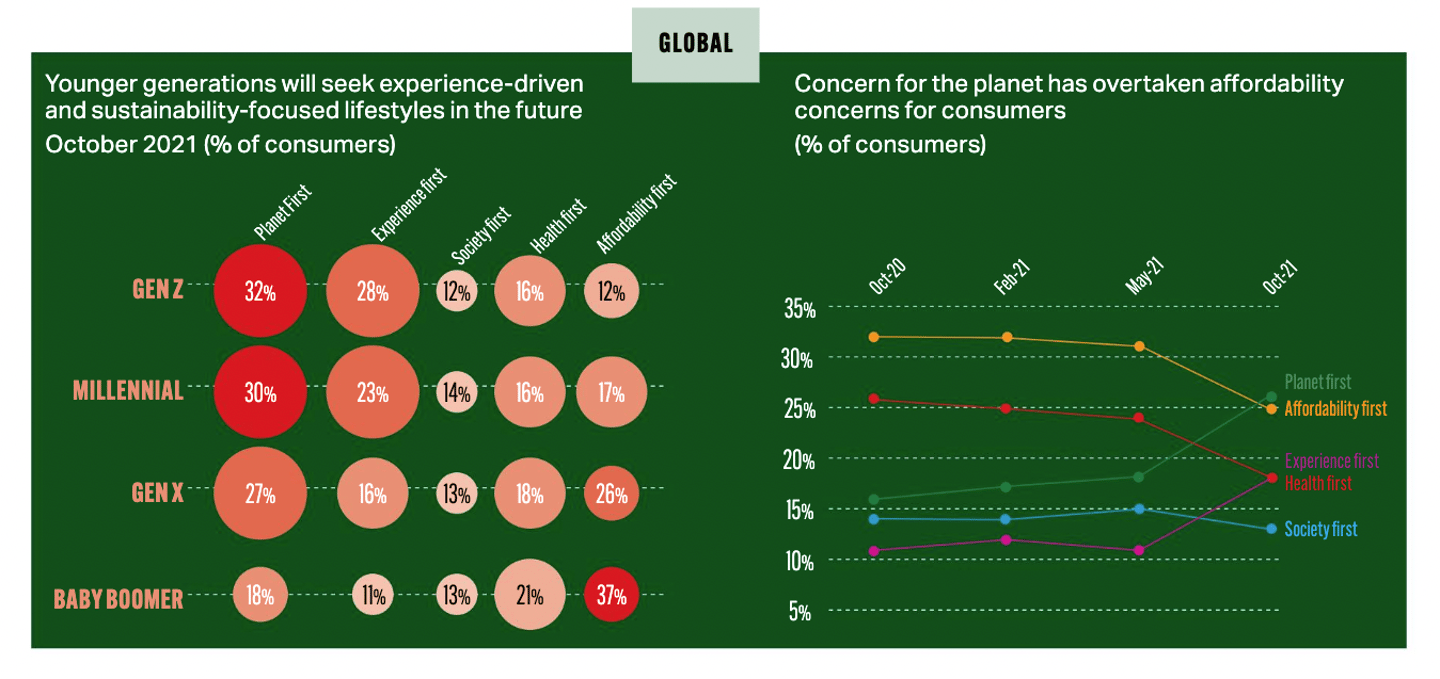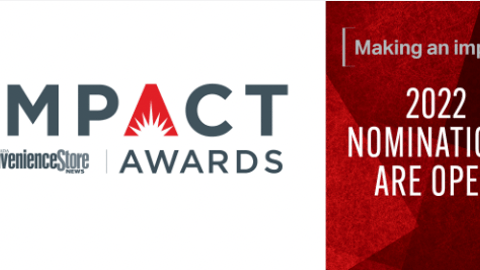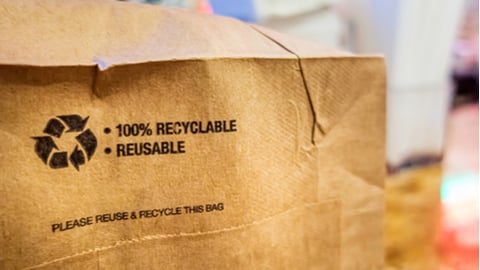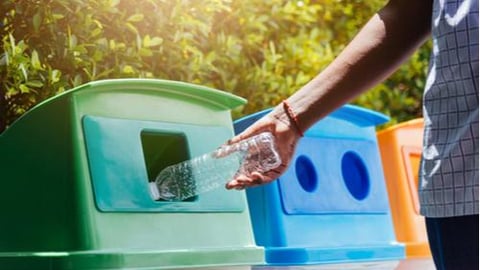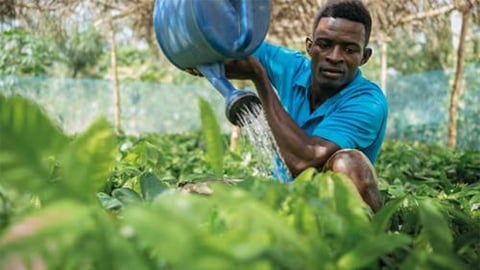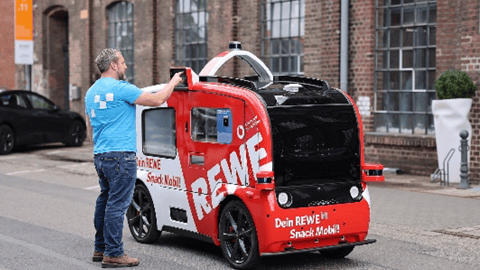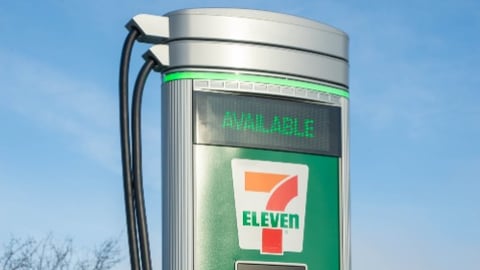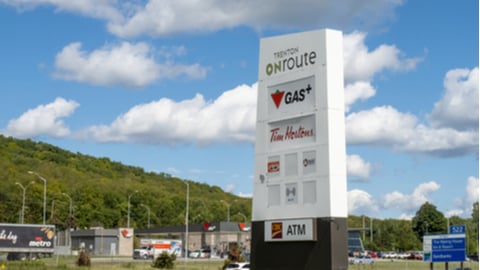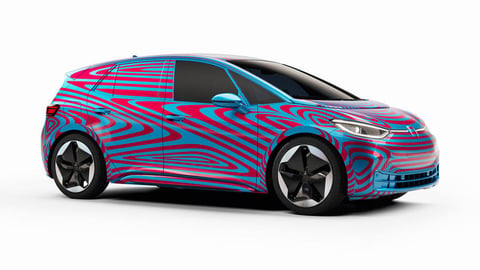2022 Sustainability Report: The future is green
Given the economic uncertainty over the past few years, you might think that the customer has reverted to making purchase decisions based on affordability, and little else.
That may have been true at the height of the COVID-19 pandemic. But that is not the priority now–and not as the customer emerges from pandemic life.
In fact, various studies show the customer is doubling down on a commitment to helping advance sustainability. And she wants to see real action from companies on environmental issues.
One study, Ernst & Young’s Future Consumer Index, tracks how consumers want to live their lives once the pandemic is over. And its most recent eighth edition shows they now care more about the future of the planet than they do about affordability and even their own health.
“There has been a compelling shift from a focus on ‘my health, my wallet’ to a focus on ‘me and my planet,’” says Kristina Rogers, EY’s global consumer leader.
The index found 26% of respondents rated the planet as their top concern, up from 16% the year prior, in October 2020. The planet led affordability at 25% (down from 32%) and personal health at 18%.
Consumers’ purchasing power
This shift in mindset will have a major impact on consumer behaviour, purchase decisions and brand preferences.
“Most people are reshaping their consumption habits,” says Rogers. “Some want to do more to preserve the planet; others want to buy less, but better quality. Understanding what’s driving customers’ purchase behaviour could require a radical response [from some companies],” says Rogers.
Lisa Hutcheson, managing partner at consulting firm JC Williams Group, says c-stores need to listen, and strive to make even small changes that will benefit their business.
“Consumer awareness – and their willingness to change loyalty based on sustainability – is here to stay,” she says. “And yet, retailers still seem to think that the brand is more important than if something is sustainable. But consumers are much more aware and savvier to buy into just a brand.” (And at least one major legacy product sold at c-stores is making sustainability core to its brand identity and consumer messaging—see below.)
This awareness is growing globally, says Hutcheson, and many retailers are responding by empowering shoppers.
She points to Danish grocery chain Coop, which launched a feature on its app that allows customers to get an overview of their CO2 footprint based on their shopping receipt. Customers see the products and brands they bought that had the smallest footprint—and the largest. (The analysis is based on factors like production, processing, transportation and food waste.)
“The demand for transparency is ever-increasing, and so this is an idea c-store operators should think about,” says Hutcheson. “The reason I say that is the cost to develop an app isn’t as cost prohibitive as it used to be. And so, giving customers a platform of transparency becomes very viable even if you own a few stores.”
Planet-friendly packaging
Douglas Horne, founder and CEO of Vancouver-based Evanesce, which designs, develops and manufactures plant-based packaging for the food service sector, agrees c-stores can’t afford to stay behind the eight ball on sustainability.
“There has been widespread realization in the marketplace that things need to be done differently,” he says.
In the fourth quarter of this year, Evanesce will begin using its patented Molded Starch Technology to mass produce 100% compostable food packaging, including food trays, cups, bowls and meal trays, saying the market is ready. The packaging will be made from agricultural waste, like potato, tapioca and rice husks, and cost about half of other eco-friendly packaging alternatives.
He says the Molded Starch technology solves the drawback of using recyclable plates and cups, which become waste if remnants of food they carried aren’t cleaned off. “With our products, the food is just more organics; it’s all compost,” says Horne.
In the other side of the business, Evanesce produces biopolymer compostable straws, hot and cold beverage cups, cutlery, drink stirrers and more. “We have been selling to convenience stores through wholesalers, and are seeing good uptick especially with the straws,” says Horne. “Because the fact is, consumers want solutions that are environmentally friendly.”
Champion energy alternatives
Reducing its reliance on plastics is a big area of focus for the big c-store chains, but far from the only one. The truth is, there are so many ways to be more sustainable and encourage sustainable behaviours.
That the world needs to evolve energy alternatives made headlines when Russia, a huge exporter of oil and natural gas, invaded Ukraine.
But those energy sources are also major pollutants. To that end, 7-Eleven announced earlier this year that it will build 500 electric vehicle ports at 250 select stores in the U.S. and Canada. (The locations have yet to be shared.)
In a statement, 7-Eleven president and CEO Joe DePinto said its goal is to “make EV charging more convenient and help accelerate broader adoption of EVs and alternative fuels.”
Parkland announced last summer plans to roll out 100 EV ultra-fast charging ports at retail locations in Western Canada and recently unveiled design plans for the “Electric Charging Destination of the Future.”
What’s on your stores’ shelves?
Couche-Tard’s 2021 Sustainability Report outlines the different ways the company is changing its business practices and updates the progress it has made with suppliers.
That includes on a promise to sell only 100% cage-free eggs at its corporate stores worldwide by 2025. It is part of a commitment to making farming more sustainable. In the Grand Canyon Region of the U.S. and western Quebec, Couche-Tard has already achieved that goal. (Even sandwiches in Quebec are premade with cage-free sourced eggs).
The report adds: “We also aim to work together with our suppliers to source meat and poultry-based foods from breeders and processing plants where animals are treated well and protected from unnecessary suffering and disease.”
Sustainability is clearly no longer a buzzword. It’s the future of business, from packaging to animal welfare to empowering customers.
MAKING CHANGE
App-etite for reducing waste
More than a third of food produced and distributed in Canada never gets eaten, according to The National Zero Waste Council in Vancouver. And globally, wasted food releases 8% to 10% of greenhouse gasses per year, from producing and transporting this food to its rotting (which emits methane.) Too Good To Go, a six-year-old Copenhagen-based climate-change-fighting company, has signed up almost 300 convenience/small grocery stores to its app since launching in Canada late last year. Its app promotes “Surprise Bags” of surplus food at one-third of the retail price. (Too Good to Go takes a small cut.) Sam Kashani, country manager for Canada, says he’s been thrilled with the reception from c-stores, noting they represent about 15% of its partners, which also include grocers and restaurants. “In addition to making a positive environmental impact, a store turns surplus food into incremental revenue and incremental traffic,” notes Kashani. Akshay Koda, a supervisor at Jayy’s Cheers Convenience in downtown Toronto, says joining the app about eight months ago has been a big success. It assembles about two to three “Surprise Bags” per day (though sometimes as many as 10), putting in items like a bag of chips, snack food, cereal and bottled beverages about to expire or have recently expired. “And the bags always go,” says Koda.
A carbon-neutral first
Mars Wrigley Canada will support the launch of its Mars bar becoming certified carbon neutral with a big marketing campaign. More than 9 million Mars bars in Canada move off shelves per year, and by Jan. 1, 2023, the company pledges it will be “the first carbon natural chocolate bar to appear on Canadian shelves.” To achieve reducing the bar’s carbon footprint by more than 25%, satellite data is being leveraged to geomap cocoa farms, enabling Mars Wrigley to monitor for risks and work with supply chain to prevent future forest loss. Alluding to the marketing campaign, Shannon Denny, director, corporate affairs at Mars Wrigley Canada, says, “By pursuing carbon neutrality for the iconic Mars bars, we hope to engage consumers in the fight against climate change.”
CBA seeking support
The Canadian Beverage Association (CBA) is looking to “work with the c-store sector in Ontario” on its transition to an Extended Producer Responsibility Blue Bin system. The system shifts full accountability to manufacturers and producers of waste rather than sharing the responsibility with municipalities. To help consumer-packaged companies in beverage fulfill this new requirement, “we’re looking for early partnerships from c-store retailers/gas bars to improve the infrastructure for recycling and make sure recyclables are rescued,” says Jim Goetz, president of the CBA. “We are excited to work on feeding the circular economy in Ontario and across the country.”
CPP tackles packaging
The Canada Plastics Pact (CPP) is creating a circular economy in Canada in which plastic waste is kept in the economy and out of the environment. This multi-stakeholder, industry-led, cross-value chain collaboration platform aims to tackle plastic packaging waste and pollution by bringing together businesses, government, non-governmental organizations and other key actors in the local plastics value chain. Canada Plastics Pact Partners are working towards achieving four clear, actionable targets by the year 2025.
CPP launched in January 2021 and, while there are no convenience retailers on the list (yet), members include high-profile suppliers, from Bimbo Canada to Club Coffee, Coca-Cola Canada, Colgate-Palmolive Company, Danone Canada, FGF Brands, General Mills, Keurig Dr. Pepper Canada, Kraft Heinz Canada. Kruger Products, Maple Leaf Foods, Mars Canada, Mondelēz Canada, Nature’s Touch, Nestlé Canada, Primo Water North America and Unilever Canada.
Sustainable sweetness
Sustainability is a growing concern for consumers of confectionery products, according to research conducted by Savanta, on behalf of Cargill.
A survey of 7,000 consumers across 10 European countries revealed:
· 70% of consumers factor sustainability into their food and beverage purchase decisions–higher still amongst younger consumers
· 74% of high frequency chocolate purchasers prefer sustainable products.
· 56% of younger consumers bought more chocolate with sustainable cocoa than regular cocoa
According to Niels Boetje, managing director cocoa at Cargill, “Our research suggests that increasingly, consumers look for… concrete claims and compelling stories that connect the products they purchase with tangible progress on critical issues like child protection and deforestation elimination.”
Cargill is paying particular attention to consumers in the 18 to 35 demographic where “just over half of these Gen Z and millennial shoppers (reported) a corresponding uptick in sustainable product purchases.”
Committing to sustainability has the further advantage of delivering higher margins. More than two-thirds of consumers surveyed indicated “they would pay more for a chocolate product made with sustainable cocoa.”
-Darren Climans
Packaging promises
- Coca-Cola Company: Recently unveiled its first-ever beverage bottle made from 100% plant-based plastic, excluding the cap and label, which was made using technologies that are ready for commercial scale.
- PepsiCo: 100% of its packaging is to be recyclable, compostable, biodegradable, or reusable by 2025.
- Mars: 100% of its plastic packaging is to be reusable, recyclable or compostable by 2025, plus the company is promising a 25% reduction in virgin plastic use.
- Hershey: 100% of its plastic packaging to be reusable, recyclable or compostable by 2030.
- Mondelēz International: Committed to making all packaging recyclable by 2025. In addition, the company has committed to a 2050 net zero emissions target across its full value chain.
Going green: 10 easy actions for sustainable c-stores
1. Replace incandescent light bulbs with energy-saving options like CLF and LED lighting.
2. Reduce paper by digitizing operations, such as inventory management, as well as employee handbooks.
3. Say no to plastic bags by offering customers paper or encouraging them to BYOB: Better yet, create a revenue source by selling reusable bags!
4. Switch out single-use plastics, like straws, cups and utensils, for eco-friendly alternatives.
5. Reduce energy waste by investing in energy-efficient equipment: Old refrigerators are energy hogs and can account for up to 40% of energy costs at a convenience store!
6. Help customers do the right thing by installing recycling bins outside your store.
7. Install water efficient taps and faucets in restrooms and kitchen areas.
8. Adjust your thermostat when possible: a few degrees can make a difference.
9. Source and stock more sustainable products and brands.
10. Communicate with and engage customers by highlighting your sustainability efforts through in-house signage and on social media.
Making an Impact!
Does your company have a sustainability initiative that you want to celebrate? Great news!
Convenience Store News Canada is thrilled to launch the CSNC Impact Awards, which recognizes initiatives introduced by retailers, suppliers and solution providers that are making a meaningful difference, from helping the planet to supporting employees and communities.
The goal is to celebrate companies—large or small—making a positive impact across four key areas:
· Sustainability (initiatives around food waste, ethical sourcing, energy efficiency etc.)
· Diversity, Equity & Inclusion
· Supporting Employees
· Community Service/Local Impact/Giving Back
There is no fee to nominate (you can even nominate in multiple categories), and honourees will be featured in Convenience Store News Canada in November. Tell the industry about the amazing work being done at your company!
Deadline to enter is August 26.
Originally published in the May/June 2022 issue of Convenience Store News Canada.


